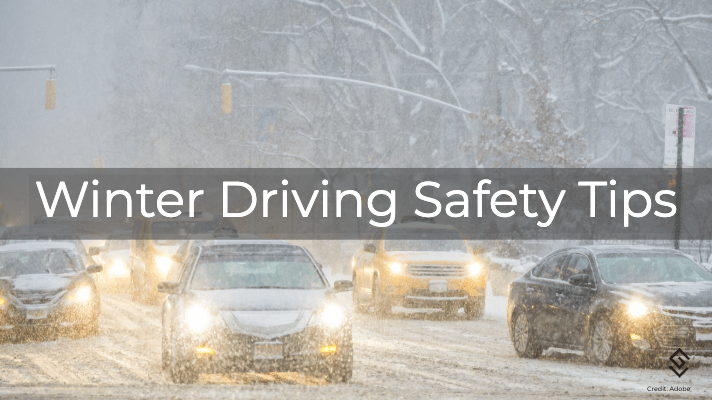Regardless if you are driving to work, taking the kids to school, or doing errands, you will want the keep our Winter Driving Safety Tips in mind before heading out on wintery roads.
Winter Driving Safety Tips #1
Get Your Car Inspected
Nothing worse than a roadside breakdown, especially during the winter. So, before you head out for your winter road trip, have your car inspected, and if necessary, serviced.
Winter Driving Safety Tips #2
Prepare a Winter Driving Emergency Kit
- Always be prepared. Stow an emergency kit in your vehicle that includes:
- An operational spare tire and jack
- Jumper cables
- An ice scraper
- A first aid kit
- Water
- Blankets
- Extra gloves, hats, and mittens
- Snacks
- A flashlight
- Flares
- Hand warmers
- Phone charger
- Tire chains
- Windshield washer fluid
Winter Driving Safety Tips #3
Driving in Wintery Conditions
If you don't have to drive, stay home, or consider public transportation. Your all-wheel, four-wheel drive, or front-wheel drive won't save you. But it can make your travels safer if you:
- Leave plenty of room between you and the car in front of you
- Avoid lane changes
- Accelerate slowly
- Adhere to safe driving speeds
- Follow emergency travel instructions
- Obey emergency route signs
- Brake cautiously
- Avoid Distracted Driving
- Travel with a full tank of fuel
Winter Driving Safety Tips #4
Plan Your Drive
Google Maps, Apple Maps, and my favorite Waze are great navigation tools, but we recommend jotting down your route (and alternate route) just in case! Additionally, let others know your plans and keep them updated regarding your travels.
If things are not going as planned, consider seeking safe shelter and resume your travels when conditions improve.
Winter Driving Safety Tips #5
Stay Rested, Be Alert: Take a Pit Stop
The stress of driving in bad weather can lead to people making bad decisions. As you become stressed and fatigued, your response time diminishes, so you need to:
- Take frequent stops to rest your eye and stretch your legs
- Drink water
- Eat
- Update others on your travels
- Clean off your car
The best way to stay safe is to stay home until the storm passes, and the road crews have time to clear the roads. If you must travel, know your limits and stay prepared.
Copyright 2019
LARGO Consulting Services, LLC is committed to providing safe and secure environments where you live, work, study, and play. For more information about LARGO Secure Schools, Vizion20XX, or Your Security Advisor, please contact LARGO Consulting Services, LLC online or call 833-LARGOCS. We also invite you to connect with us on Facebook, LinkedIn, and Twitter.

